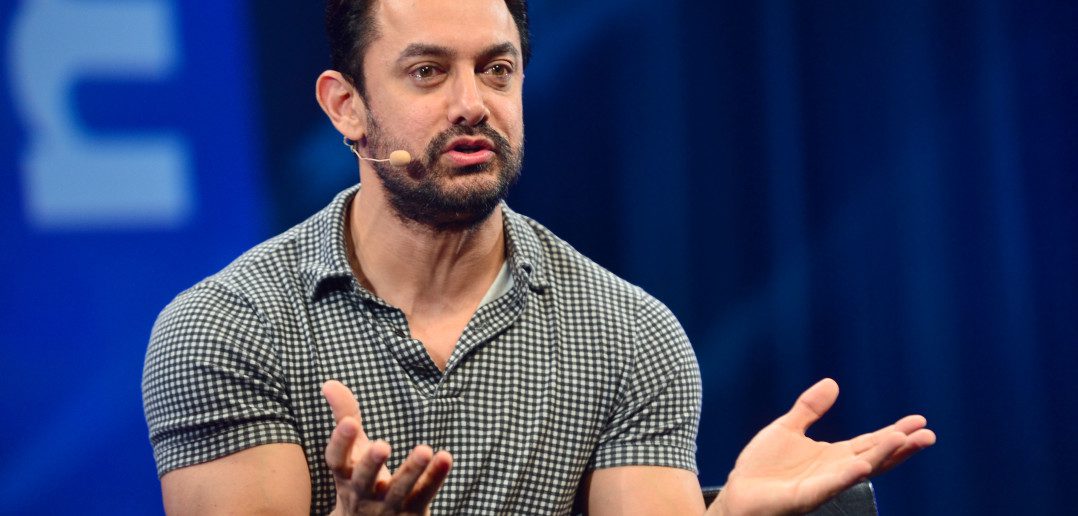Actor, director and producer Aamir Khan.
Aamir Khan, Indian star of stage and screen, had a dream. It was based upon a simple idea: « TV has great power. It’s in every home in India. So can’t we do something with the potential to bring about huge social change? »
That thought became a format project, into which he wanted to pack social issues that Indians live with daily but don’t want to talk about. A few choice ones: female foeticide, road safety, and child sex abuse. Before pitching it to Star India, a major network, he researched it to ensure he had a show. « When we finally had the material and were satisfied, we felt that now it doesn’t matter if Star says no. I could do it on the internet. »
The great news was, Star said yes! So Khan gave them three conditions to carrying it:
– It must be in multiple languages. « If you want to reach out to people, you have to be able to communicate with them in their own language… India is a bit like Europe, with different languages and customs, » Khan explained.
– All channels under the Star stable should play the show, at the same time, in different languages. « I didn’t want just one channel. I wanted the whole network, » he added.
– In states where Star is not the leading channel, Star had to agree to give the show to its competitor.
It was at this last one that Star blanched, and asked for a different third condition. So Khan said, « Okay. In the main language we’re making it in, that’s Hindi, I want it to go to your competitor too. »
The result was Satyamev Jayate, which in English means « Truth Alone Prevails ». Today it’s in its third season, and is watched by over 600m Indians per week.
Asked by Spurlock whether he was nervous about the initial public reaction, Khan conceded. « But people connected emotionally, which told us they wanted change, » he said. « There is a socially relevant vacuum people want to tap into; it deals with their daily lives. »
One episode tackled road safety, likening the numerous car accidents in Indian cities to murder.
« These are not accidents, » said Khan vehemently. « If you can do things that can change the outcome, they aren’t accidents »—in India, driving tests aren’t done properly, licenses are given freely, and most truck drivers are intoxicated and overloaded, he said.
« Under these conditions, an accident will always happen. These are very preventable, » he said.
The episode made an impact: « There’s a new bill coming out on road safety and transport rules. We hope there’ll be a stronger law. »
Satyamev Jayate also gives people clear ways of helping or seeking help. A relevant organisation is selected for every episode, so even if you don’t have time to volunteer, you can donate.
As an example, AA was a partner for its alcohol abuse episode. « They were a very dynamic partner, » said Khan. « We flashed their number on our screens and there was a huge flood of responses, so a lot of people could be helped. » 400.000 people called AA in the first 2-3 weeks, but the calls haven’t stopped yet, he added.
Spurlock asked about the government response; typically, when something makes an impact like this, the government tries to mitigate it, he pointed out.
This hasn’t been the case with Satyamev Jayate. « In India, there have been at least 9 or 10 examples of civil servants or politicians taking the initiative [of a given episode]forward. » In the case of female foeticide, a health minister caught wind of the issue and clamped down hard on abusers.
« Before, the ratio of girl/boy children was 890 girls for every 1000 boys, which is very low, » said Khan. « Now the ratio is 940 girls for every 1000 boys. »
But in order to tackle such delicate topics, it’s important to avoid an accusing voice. « I can’t blame or attack people, » said Khan. « That’s the heart of the show; we’re approaching them with love. »
He explained, « a show like this helps them understand the basics of any topic, the sociological impact of what you do. » You could be a guy who kills his daughter, but in the end you’re just one man, said Khan. The show demonstrates you’re part of a larger group of people killing their daughters, utterly altering the face of the country.
And while it’s easy to feel rage, you have to understand where people are coming from.
« The Untouchables, for example, are 15% of the Indian population, » said Khan. « So you have to try convincing 85% of Indians that ‘maybe what we’re doing isn’t so nice.' »
Or in the case of dowries, which most families have either given or received, « I’m telling them dowries aren’t good, you shouldn’t be taking it. The TV they’re watching the show on is probably from a dowry! So you can’t get angry. I have to approach the person with love so he’s open-minded enough to listen to me. He senses it, » Khan said.
The kiss of death, though, is putting people to sleep. « What do you do when people say they think the show’s too serious? » asked Spurlock.
« You can have serious content that’s extremely engaging, » said Khan.
Topics like female foeticide aren’t people’s favourite way of starting their Sunday morning. So Khan slides in slow: Audience members never know the topic before the show starts.
Then he kicked off the episode by asking, « ‘Who’s the most important person in your life?’ Most people will say their mothers, » he said.
« Then I talk about mothers, motherhood, and about my own mother. I say, ‘let’s talk about how we’re treating our mothers today. » Enter a lovely older mother who’s had eight forced abortions. « You care about her, » he said, « she’s a mother you’re listening to. »
« My ability as a storyteller is to touch people’s hearts. We’re combining that with journalism, » Khan said. « People who want to make serious journalism have to keep this in mind »—it should be so entertaining, « they shouldn’t be able to blink while they’re watching! »
In a previous version of this article, Star India was written as Starz. Special thanks to Anil Wanvari for correcting the error.




